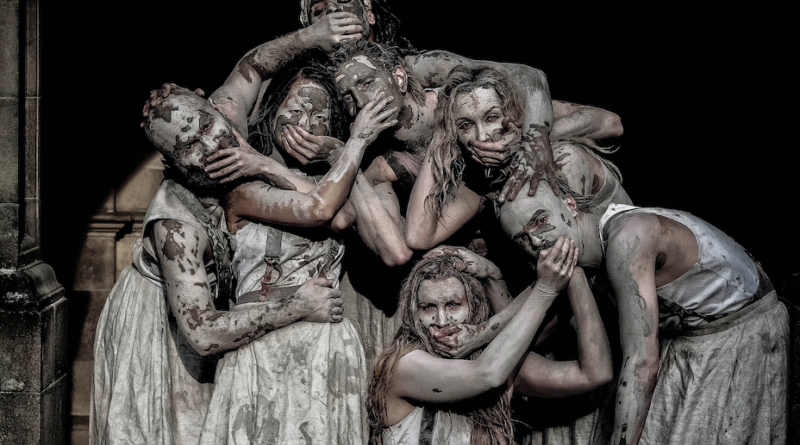INTERVIEW: Flabbergast’s acclaimed ‘Macbeth’ brings its dirt and clay to London
Photo: This Macbeth production has been in development for years by Flabbergast Theatre. Photo courtesy of Picture Grafix / Provided by Gingerbread Agency with permission.
Flabbergast Theatre has been developing its current production of Shakespeare’s Macbeth for years, and after a celebrated run at the Edinburgh Fringe Festival, the company is ready for London audiences to play in the dirt and clay of their unique vision of the Bard. Macbeth runs until April 8 at the Southwark Playhouse.
Simon Gleave, a stage actor and theatrical teacher, plays the title role in the production and has helped to develop the piece as a Flabbergast associate artist. He has fond memories of the Edinburgh run and cannot wait for London audiences to experience the same energy.
“It went really well,” Gleave said of last year’s Fringe run. “We were very well received. I mean, Edinburgh right now is a little precarious. I think it’s emerging out of lockdown as lots of things are, so audiences are getting back to their feet. It was incredibly intense, as it would be. We had one day off. We performed the show 24 times, and it’s a very dirty show. We’re covered in clay. We’re pouring wine over ourselves. We’re kicking up a lot of dust, and we’re rolling around on the floor and singing and screaming, entering these trance states. So it was an intense time of it, but it was incredibly fulfilling and wonderful.”
Gleave said he believes the show has done so well because it’s simultaneously funny and dark, showcasing a classical touch and a robust physical sense. The London run should be even more enhanced than in Edinburgh because at the Fringe Flabbergast was limited to a 90-minute show and certain technical limitations. At Southwark Playhouse, all restrictions are gone, and the theater company intends to use its newfound freedom.
“I like to use the word synthetic,” Gleave said when describing what sets this Macbeth apart. “It’s not a new thing. I think actually what we’re doing is something that’s quite old. Stewart Lee, who is a comedian and writer that many of us in the company love, came to see it, and he said it reminded him of when he was in the early ‘80s when he was starting out as an artist. And you would see work from the likes of Poland or France or Italy or Russia even, further afield, and you would see … the use of puppetry, the use of a certain poor theater physical aesthetic, let’s call it, incredible physical discipline and detail. And then with a search for something that’s ancient as well as something that’s contemporary, I hope that those things are what sets it apart.”
Gleave described Macbeth as a play about the supernatural, about power, violence, desire, and ultimately madness and tyranny. These extraordinarily large themes are visceral inside a theater, and the actor believes that some of the elements in their production need to be frightening in order to give justice to those themes. After all, the show should frighten as much as Macbeth is frightened on stage.
“Theater is a composite of languages,” he said. “It’s a physical language as well as a musical language as well as a spoken language, and I think that the show is a little bit older, braver, madder than your average adaptation. I think that’s why people are resonated or excited by it. Some people are horrified by it. We got great audience feedback from Ludlow Castle when we were there last summer saying, ‘I didn’t understand what the hell you were doing. It seemed like nonsense to me,’ which was someone from the local amateur dramatic society, which was fun, fine, great. But, by and large, people connect to it because it’s operating on multiple levels.”
This vision is brought to life by Henry Maynard, who is not only the director of the show but also the artistic director of Flabbergast. Gleave has been working with Maynard for five years. In the early days, they centered on the masks and the clay, but eventually the artists met with Matej Matejka, a Slovakian physical theater artist who is credited as the movement director for the production. He brought an appreciation for the so-called Grotowski method to the show, and this paired nicely with the Lecoq artistry that Gleave and others had been trained in.
“I went to the Lecoq school in Paris,” he said. “So it became a really interesting creative conflict between the playfulness, let’s say, of clown and … a lot of gestural work that Matej brought. That was the creative collision that set things up alongside the work of Adam Clifford on music to extend that space. It’s been a long ride. … We weren’t a particularly musical company before this show, and now we’re quite a musical company because we’ve learned over the last three to four years many new skills and developed ones that we already had.”
By John Soltes / Publisher / John@HollywoodSoapbox.com
Macbeth, a production by Flabbergast Theatre, continues through April 8 at the Southwark Playhouse in London. Click here for more information and tickets.

